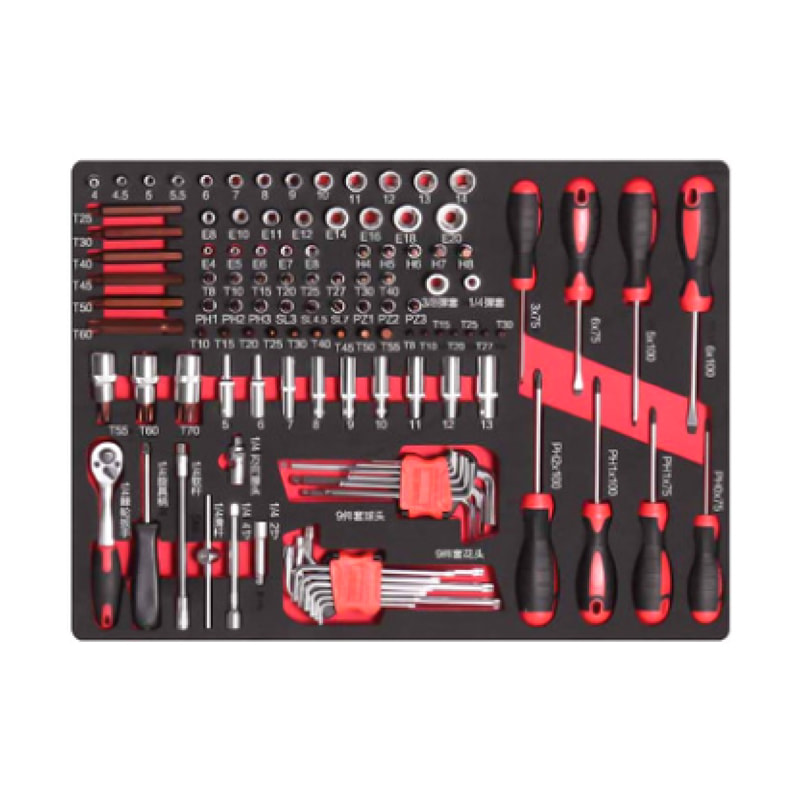A basic vehicle tool set is sufficient for certain situations, particularly when dealing with common or routine tasks, while a more extensive set may be necessary for more complex or specialized work. Here’s a breakdown of when each type might be appropriate:
Situations Where a Basic Vehicle Tool Set is Sufficient:
Routine Maintenance: A basic tool set is ideal for everyday tasks such as changing the oil, replacing air filters, checking battery connections, and topping off fluids. These sets typically include essential tools like screwdrivers, pliers, a few wrenches, and a socket set, which are all you need for these types of jobs.
Emergency Repairs: For unexpected breakdowns or roadside emergencies, a basic tool set is usually sufficient. It allows you to perform quick fixes such as tightening loose bolts, changing a flat tire, or replacing a blown fuse. Having a basic set in your vehicle can be invaluable in such situations.
Beginner-Level Repairs: If you’re new to vehicle maintenance or working on your car as a hobby, a basic tool set provides the fundamental tools needed to get started. Tasks like changing spark plugs, replacing headlights, or installing new wiper blades can be done with a basic set.
Limited Budget or Space: If you’re working within a budget or have limited storage space, a basic tool set offers a cost-effective and compact solution. These sets are often portable and can be easily stored in the trunk of a car or in a small garage.

Situations Where a More Extensive Vehicle Tool Set is Necessary:
Advanced Repairs and Maintenance: For more complex repairs, such as engine work, brake replacements, suspension adjustments, or transmission work, a more extensive tool set is necessary. These sets often include specialized tools like torque wrenches, a wider range of socket sizes, deep sockets, and more precise measuring tools, which are essential for handling these tasks correctly.
Professional Use: If you’re a professional mechanic or someone who frequently works on vehicles, a comprehensive tool set is essential. It provides the variety and quality of tools needed to tackle a wide range of repairs and ensures you have the right tool for any job that comes into your shop.
Restoration Projects: Working on classic car restorations or extensive rebuilds requires a more extensive tool set. You’ll need specialized tools for tasks like bodywork, engine tuning, and electrical system overhauls. A larger set will give you the versatility to address the unique challenges of restoring older vehicles.
Multiple Vehicle Types: If you work on different types of vehicles, such as cars, trucks, motorcycles, or even small engines, an extensive tool set is beneficial. These sets include a broader range of tools that can accommodate the varying needs of different vehicles.
Long-Term Investment: For those looking to invest in their automotive repair capabilities over the long term, an extensive tool set provides a robust foundation. It offers durability and a wide array of tools that will last through years of use, making it a wise investment for serious car enthusiasts or professionals.
In summary, a basic vehicle tool set is great for everyday tasks, emergencies, and beginners, offering convenience and essential functionality. On the other hand, a more extensive set is necessary for advanced repairs, professional use, and specialized tasks, providing the depth and range of tools required to handle a broader scope of work.

 ENG
ENG  English
English Deutsch
Deutsch











 +86 (0)512-5297 3238
+86 (0)512-5297 3238 +86 (0)512-5297 3239
+86 (0)512-5297 3239 info@chinagoldenline.com
info@chinagoldenline.com  No.58, Yangguang Avenue, Yushan High-tech Industry Zone, Changshu City, Jiangsu, China.
No.58, Yangguang Avenue, Yushan High-tech Industry Zone, Changshu City, Jiangsu, China.

